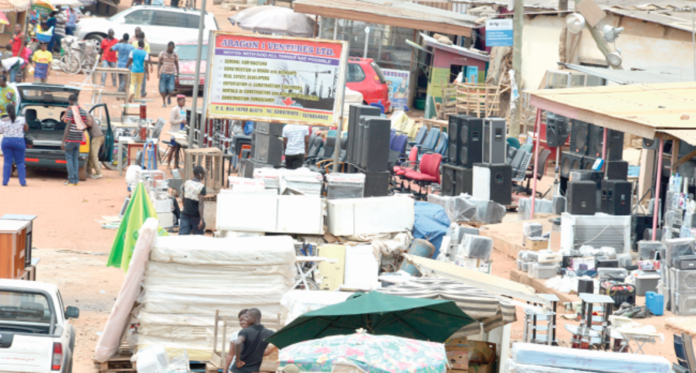
The Concerned Second Hand Dealers Association of Ghana is breathing on the neck of government over government’s decision to ban the importation of used appliance into the country.
They argue that the move will affect the livelihood of the over two hundred thousand members of the association, particularly under the current economic situation.
President of Concerned Second Hand Dealers Association, Daniel Asare, disclosed this in an interview on Adom FM’s morning show, Dwaso Nsem Thursday.
The decision to ban the importation of second hand electrical appliances, popularly known as ‘home use’, is to save the public from carbon emissions.
The Energy Commission has said Ghana was gradually becoming a dumping site for electronic waste as a result of these products.
It has, therefore, hinted of an implementation of the ban to save Ghana’s eco-system.
But President of Concerned Second Hand Dealers Association said the claim by Energy Commission that Ghana is a dumping site for electronic waste is not backed by science and data.
Rather, he indicated that the Commission is basing its argument on a 2012 documentary by a foreigner about e-waste in Ghana.
Mr Asare said they are serving a public good because they are creating employment and also selling affording appliances to poor Ghanaians.
“Most of our products are merchandise cleared from shops abroad which we buy at lesser costs and import into this country to sell. They have low energy consumption rate as compared to brand new products from China which are being recommended to the public by the Energy Commission,” he opined.
Mr Asare appealed to government to intervene and stop the ban on the importation of second hand appliances.
Meanwhile, Assistant Manager in charge of Energy Efficiency Inspection and Enforcement at the Commission, Hubert Nsoh Zan, said the ban will be effected.
He explained that, the country needs to strengthen its regulations to block the influx of electronic waste from other jurisdictions into its market.
Mr Zan said they owe to consumers to ensure that an electrical appliance imported into Ghana “meets a minimum energy performance.”

